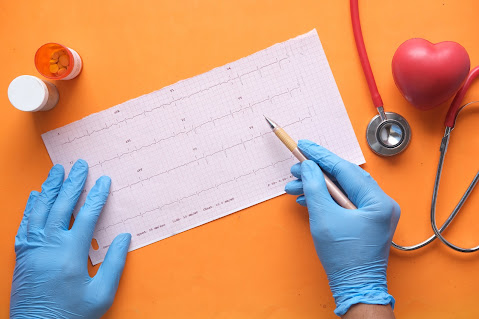 |
| Maintain a healthy heart with a healthy lifestyle |
Tips to Keep Your Heart Healthy
As you age, the likelihood of heart disease increases. Unfortunately, many people do not stop to think about the impact that different lifestyle choices have on their hearts until they develop a heart condition.
The Centers for Disease Control and Prevention reports that 1 in every 4 deaths in the United States is from a cardiovascular condition. Learning how to keep your heart healthy as you age is a great way to reduce your risk and bring this number down!
Read on for some great tips and tricks that will help you live a long life free of heart disease.
1. Eat Healthily
When you eat unhealthy foods, not only do you increase your risk of developing heart disease but also other diseases.
Some great foods to incorporate into your diet include:
- bananas,
- beans,
- nuts,
- whole grains,
- fish,
- poultry,
- and low-fat dairy.
These foods help to lower your cholesterol levels, reduce fat in your blood vessels, improve the function of your heart muscles, and more.
 |
| Lower your blood pressure |
Bananas:
If you have high blood pressure, you might also consider foods that lower blood pressure. Foods high in potassium are great for this, including bananas.
Getting enough potassium helps maintain a healthy heartbeat, according to Michelle Routhenstein, RD, a preventive cardiology dietitian. “When potassium is deficient, low levels can cause heart arrhythmias and potentially impair blood flow to the brain, muscles, and organs,” she says.
2. Stay Active
As you age, it is important that you stay physically active to keep your heart healthy. If you are not an exercise enthusiast, start small. Take your dog for a walk around the neighborhood or go for a swim.
You should work up to exercising for 30 minutes five days per week. During your workouts, it is best to incorporate at least 10 minutes of moderate-intensity cardiovascular activity. This can include swimming, cycling, or jogging.
Make sure not to overexert yourself, and remember to stretch before and after your workout as well!
3. Stay Hydrated
Dehydration can increase your blood pressure and cause many other health conditions that put a strain on your heart. Be sure to drink plenty of water, and aim for six to eight glasses per day.
You can also drink plenty of other liquids, including milk and 100 percent fruit juice. Just be sure to refrain from drinking sodas and other sugary drinks.
If you do not like the taste of plain water, try adding a squeeze of lemon, some lime slices, or a sprig of mint. Or, you can even infuse your water with different ingredients to give it an exciting twist!
Additionally, you can try out IV Therapy, which provides health benefits to your skin, immune system, and heart, and also gives you deep hydration!
4. Moderate Alcohol Consumption
If you enjoy alcohol, you will be pleased to know that drinking alcohol actually provides some heart benefits! According to Mayo Clinic, red wine has been shown to provide quite a few benefits.
This doesn't mean that you should drink in excess, though. Make sure to limit yourself and drink reasonable amounts so that you don't do more harm than good.
5. Take Vitamin Supplements
If you are over the age of 50, you may want to consider taking a daily vitamin supplement. Many people do not get all the vitamins and minerals they need each day to stay healthy.
When you are older, your body will not absorb as many vitamins and minerals, so adding a supplement to your diet can fill in the gaps. Vitamins like vitamin C and E are also great for keeping your heart strong or helping with heart disease.
There are a few different ways that you can get extra vitamins into your system, including:
- Pill supplements
- Gummies
- IV therapy
- Dissolvable pills
6. Stop Smoking
If you are a smoker, quitting smoking can do wonders for your heart health. Smoking increases your risk of developing atherosclerosis and cardiovascular disease significantly.
Quitting smoking is hard, but not impossible! Try to set some goals. For example, you can start by cutting down to one cigarette per day and slowly reduce your daily intake before finally stopping altogether.
Doctors can also help you wean yourself off smoking with the aid of medicine and therapy so that you are ready to stop smoking for good.
7. Eliminate or Reduce Stress
A little stress is a normal part of life, but constant high-stress levels are way more harmful than you think. A recent study on the link between stress levels and heart disease found that women going through two or more divorces in an 18-year period had a similar heart attack risk to a smoker or a person with diabetes.
To keep your heart healthy, you should look for ways to reduce stress in your everyday life. Here are a few ideas to try:
- Take the scenic route every once in a while to help you relax and unwind.
- Practice deep breathing when you're feeling stressed.
- Try meditation or yoga.
- Spend time with friends and family members to help you feel relaxed and less stressed.
8. Own a Pet
Owning a pet can have a lot of health benefits. In particular, pet therapy can help reduce heart disease in humans by lowering blood pressure and cortisol levels.
Pet ownership can also help reduce stress levels and give you an excellent opportunity to exercise, so if you've been thinking about getting a pet, here is your sign!
 |
| Set up an appointment with your Physician |
9. See Your Doctor Regularly
The best way to keep up with your heart health is to see your doctor on a regular basis. Your doctor can help keep track of any changes in your heart health as you grow older, and it is crucial to have a doctor who knows your medical history.
If you are not already seeing a doctor regularly, make sure to schedule an appointment right away.
10. Get a Good Amount of Sleep
Getting a good night's sleep can help you reduce stress, boost your immune system, and stay healthy. When you are lacking sleep, your heart will feel the effects.
Make sure that you are getting around 7 to 8 hours of sleep each night. If you have trouble doing so, try turning off all electronic devices at least one hour before bedtime and avoid drinking caffeine in the afternoon to help you fall asleep faster and stay asleep.
Conclusion
As you can see, there are plenty of ways to keep your heart healthy. There are so many options; whether you want to drink more water, eat healthier, or cut out smoking and stress, there is a solution for everyone.
If you can manage to do these things, your heart will thank you later!
Author: Angela Boda is a representative of Dermamode, a medical aesthetics company based in Montreal, Canada. Angela has always been fascinated by how we look on the inside as well as our appearance on the outside. She loves writing on various topics from health to beauty. Her goal is to help others look and feel their absolute best.

